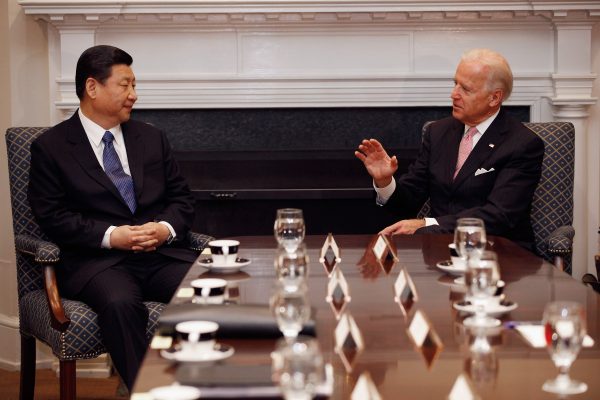Blinken castigated China’s increasing authoritarianism and assertiveness, ‘at home and abroad’. He claimed that allies of the United States were united in this view. Blinken called out China over its human rights record in Tibet, Xinjiang and Hong Kong as well as voiced concerns over Taiwan, ‘assertiveness’ in the South China Sea, the COVID-19 pandemic, cyber-attacks on the United States and economic coercion ‘of our allies’, presumably Australia though it was not named. He declared that these issues threaten ‘the rules-based order that maintains global stability’.
In what the Western media mislabelled a tirade, Yang did not hold back. He fingered the Americans for hypocrisy, demanded respect and that the United States and China with all their differences engage as equals.
Although the prelude to the high-level Sino-American talks at Alaska may not have gone entirely to script, it reflected the need on both sides to take domestic audiences with them wherever they might be able to eventually take the relationship between both nations.
China has changed vastly since President Joe Biden was in the Obama White House more than four years ago. President Xi Jinping has continued to consolidate political power and a more confident and assertive China is no longer hiding or biding time.
The United States has also changed. The divisions across social, racial and economic lines have deepened and spilled over into the streets and the most powerful country in the world, under Biden’s predecessor, abandoned its leadership role of the global commons.
The election of Biden makes the United States a more predictable great power acting in its own self-interest but the negative global legacy of the Trump administration hangs in the air. Whether the United States can regain its global moral authority remains to be seen.
The Biden administration’s approach toward China is gradually emerging. On the surface, it looks very much like a continuation of the Trump administration’s strategic competition. The actions of China have helped to lock in the hardened positions in Washington, and to reinforce them among US allies and partners.
In the bilateral relationship with the United States, China has been a price taker. It has retaliated in kind to economic warfare from Trump and now in a similar way to sanctions from President Biden.
Meanwhile, it is domestically and in its immediate neighbourhood where China has pushed for more elbow space and flexed muscle. Part of this has been in response to what China has felt as encroachment from the United States and its allies, unleashing nationalism and counterproductive diplomacy.
This downward spiral in the most important relationship in the world has still to find a bottom. The Biden administration’s approach may be more evident 65 days in but it’s not yet clear where it will lead nor how considered or reflexive it will be.
Mr Biden said just last Thursday that he sees ‘stiff competition with China’. In our lead article this week Jia Qingguo asks whether that competition will mean a shift from the malign competition that was typical under Trump towards a more benign competition under Biden.
Malign competition is where each country seeks to undermine rather than outperform the other. Jia explains that ‘the Trump administration trashed the engagement policy that previous US administrations — both Democrat and Republican — adhered to after the normalisation of China–US relations in 1979’. Under Trump the US ‘devoted much energy to smearing China, accusing Beijing of trying to destroy freedom and democracy and dominate the world through territorial expansion and diplomatic coercion’.
In the speech last week, Mr Biden said that ‘China has an overall goal, and I don’t criticise them for the goal, but they have an overall goal to become the leading country in the world, the wealthiest country in the world and the most powerful country in the world. That’s not going to happen on my watch, because the United States is going to continue to grow and expand’.
To Beijing that is a clear statement that the United States does not welcome China’s rise, peaceful or not — that there is deep reluctance to treat China as an equal or with respect. Coupled with the reiteration of holding a democracy summit and framing the China–US competition as the struggle of the generation between democracy and autocracy, it seems it’s not just China’s power and wealth that the United States fears, but the colour of China’s political system.
A foreign policy for the American middle class thus far looks like malign competition with China.
A positive signal out of Washington was the announcement of more than doubling the investment in science and technology. That’s a step towards benign strategic competition: trying to outperform China.
Jia is clear that US behaviour is not the only factor at play: much will ‘depend on how China responds to US actions’ on the thorny issues between the two countries.
Taking Chinese frustrations out on Australia with trade sanctions, for example, is not the answer, no matter what offence Australia’s insults and missteps may have caused. Massive vaccine diplomacy, maintaining economic growth, continuing reform and signing up to and honouring international treaties to further embed the market are better approaches that will provide evidence of China’s reciprocating and demonstrating mutual respect.
The United States would serve its own democracy and democracies globally best by self-improvement, and demonstrating how a great democracy can self-repair and improve. The creation of exclusive clubs of democracies, when many are faltering, will only lead to deepening polarisation and unstable geopolitical disequilibrium.
The EAF Editorial Board is located in the Crawford School of Public Policy, College of Asia and the Pacific, The Australian National University.


…we see an exclusive club of autocracies, as well, that are polarizing the rules based system…particularly, human rights.